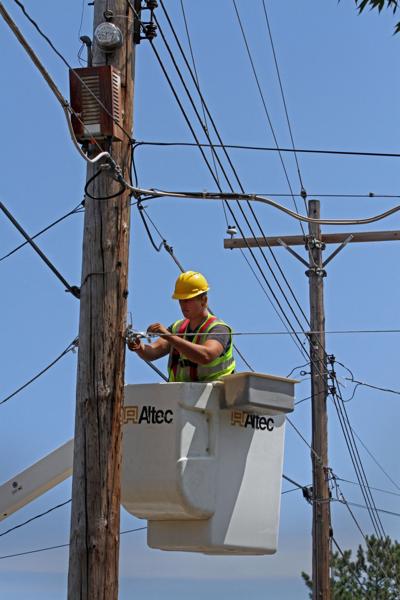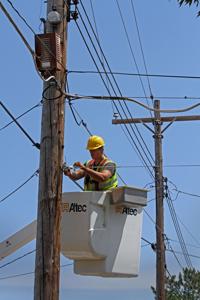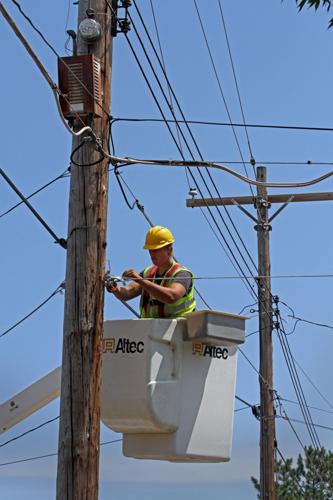COEYMANS — The push for rural broadband has taken on greater urgency in the wake of the coronavirus pandemic.
The town of Coeymans, just over the Greene County border, is surveying residents on broadband access in an effort to locate areas of the town that lack coverage.
The town will use the survey to advocate for better broadband coverage with lawmakers, including U.S. Rep. Paul Tonko, D-20, who represents Albany County.
“Most area internet providers say they provide service, but actually do not, or have no plans to service our area or the cost to the customer is astronomical,” said Coeymans Town Councilman Brandon LeFevre, who is organizing the broadband survey.
Two dozen people have completed the survey and the town is hoping for more responses.
The survey can be found at www.coeymans.org/2020/04/13/broadband-internet-survey.
Broadband coverage is spotty and inconsistent, LeFevre said.
The Mid-Hudson Data Corporation, based in Catskill, received $640,296 in federal funding in May for broadband internet development in Columbia and Greene counties. The company was awarded the money from the Federal Communications Commission’s Connect America Fund.
Arnie Cavallaro of Mid-Hudson Data Corporation declined to comment on the federal investment Wednesday.
Since 2015, the administration of Gov. Andrew Cuomo has invested $500 million statewide in broadband networks. The administration’s goal was to achieve broadband access for all New Yorkers by 2018.
Despite state and federal initatives, LeFevre said many homes in Coeymans, including his own, still lack adequate internet access.
State Sen. George Amedore, R-46, acknowledged the frustration LeFevre and others feel.
“The state made a $500 million investment to ensure broadband for every New Yorker, but too many communities are still frustrated because those promises haven’t been kept, and we can’t allow bad actors to slow this process any longer,” said Amedore in a statement Friday.
“It continues to amaze me that we can land a rover on Mars, but communities who desperately need it still can’t get access to affordable, reliable broadband,” the senator said.
Cooperation between the state, federal representatives and private companies to bring about reliable internet is long overdue, Amedore said.
LeFevre was inspired to start the broadband survey after speaking with many Coeymans residents about the lack of internet access while he was campaigning for his position on the council.
But the coronavirus pandemic made LeFevre’s mission more important, as schools and work functions moved online.
With the possibility looming that distance learning may continue into the fall, internet coverage is more vital than ever, LeFevre said.
“It is going to be crucial for residents to have internet, especially with the unknown of what is going to happen with school,” LeFevre said, adding that families shouldn’t have to drive to a library or a firehouse with internet to submit homework assignments.
The Federal Communications Commission’s Rural Digital Opportunity Fund will award internet service providers with $16 billion in funding over 10 years to build out voice and broadband service in rural areas of the country. The FCC will begin taking bids through a reverse auction process starting in October.
New York was originally excluded from receiving any of the $16 billion, but that decision was overturned under pressure from state lawmakers.
Charter Communications, or Spectrum, requested a waiver to exclude 2,127 census blocks from Rural Digital Opportunity Fund eligibility, a move opposed by officials including U.S. Rep. Antonio Delgado, D-19, and Assemblywoman Didi Barrett, D-106.
The waiver was sought “to avoid overbuilding areas in which Charter has already begun the process of deploying service,” according to the request.
The FCC has announced it would grant Charter Communications’ request, a move that will reduce broadband competition in areas where Charter is required to build as part of its 2016 merger with Time Warner Cable.
Delgado assailed the FCC’s ruling Monday.
“The news that more than 2,000 census blocks will be excluded from these funds once again leaves our upstate communities behind and furthers the digital divide,” Delgado said. “I urge the FCC to reconsider this decision and allow our upstate communities the opportunity to apply for these funds.”
Lara Pritchard, Charter’s senior director of communications for the Northeastern Region, said this is an issue of timing, as buildouts are already underway.
“The best way for the FCC to ensure the most effective use of scarce subsidies and increase access for as many unserved New Yorkers as possible was to grant Charter’s petition to concentrate these subsidies on the nearly 9,000 truly unserved Rural Digital Opportunity Fund-eligible areas in the state,” the company said in a statement. “Whether it is work, school, or keeping in touch with friends and family, high-speed connectivity has never been more important, and the FCC’s action will prioritize access as quickly and to as many unserved families and businesses as possible.”










